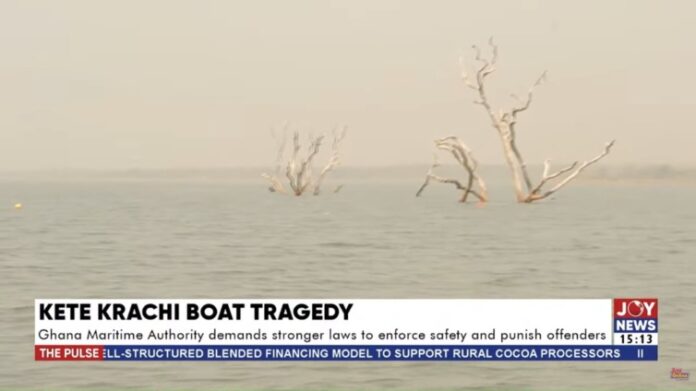Beyond the crushing details of last Saturday’s boat disaster that claimed 16 lives on the Volta Lake, the story of a single family that lost four members in the accident evokes even more chilling emotions.
Two siblings, their mother, and a niece were among the dead in the latest disaster on another journey by boat on the Volta Lake, a familiar story in water transport in the system.
But it was also a story of a grandfather’s bravery that saved a mother and her half-year-old son, summoning all of his decades in the trade to save himself and two others among the overall eight that eventually survived.
Details about how Belinda Ayikpa, the 18-year-old mother, and her six-month-old son, Xorse Akpatsu. escaped death purely describe the heroics of the 61-year-old boat operator, Ezugah Apenuzornya, grandfather to Belinda.
Narrating the harrowing ordeal to the Daily Graphic, Belinda, a petty trader said she boarded the boat with 23 others at the fishing island community heading to Debu for a funeral that fateful day.
The journey started around 11:30 a.m. with her mother, grandfather (boat operator), younger brother, sister, a niece and her six-month-old baby onboard the boat.
She said a few minutes after the boat started the journey from Okuma Island, the operator had to stop when he was informed by his assistant that water had entered the boat.
By the practice of boat transport on the lake, an assistant continues to scoop water from the boat all through the journey to ensure the water does not add weight to the boat.
In the case of Belinda and her fellow travellers, the assistant’s bucket fell into the lake, upon which he drew the attention of the operator with loud shouts to stop.
She said in the process, the boat tilted one way and finally capsized, thereby throwing the passengers into the lake.
“My baby and I were saved by my brave grandfather, Ezugah, who held me to hang on the overturned boat,” she narrated.
Overcome by emotions as she recalled the harrowing scenes of near death, the grief stricken mother said it was then that “I watched my mother, sister, brother, niece and other passengers perish”.
Herself hanging precariously on the dangling boat with her baby strapped against her body, she was powerless to participate in the rescue effort to save her family members and any other passengers.
She said she and the other seven survivors, with the guidance of Ezugah, horrified by what they saw, screamed as loud as possible for assistance until another boat arrived to rescue those who had managed to hold on a bit longer.
She said their desperate struggle for survival in the deep river lasted for a while.
As Vice-President Professor Naana Jane Opoku-Agyemang commiserated with the community during the week over what she described as a national disaster, the weight of the tragedy felt profound.
Prof. Opoku-Agyemang donated 650 life jackets from various government sources to the people for their transport on the lake, and announced further interventions by government to lighten the pain of the bereaved families.
Amid the outpour of grief, tradition and culture conspired to force another twist to the traumatising experience of the people of Okuma Island in Kete-Krachi in the Oti Region.
Local tradition and culture do not allow persons who die by accidents to be buried on the island community because the experience is considered a bad omen.
Instead, the graves are prepared in foreign areas to supposedly keep such disaster away from the community in the future.
The tradition may have been adopted by forebears of the people as a way to deal with trauma by keeping the graves of such disaster victims out of immediate sight, but the lessons have fallen on the people.
After being consoled by the Vice-President, Belinda appealed to the government to provide them with a source of potable water since they relied on the river.
She also appealed for the area to be connected to the national grid to improve livelihood, enhance education and support small-scale businesses.
She said it was regrettable that there were only four teachers across all the stages of basic school in the community, where most of the children had to cross the river before reaching their school.
Source: Graphic.com.gh
ALSO READ:


